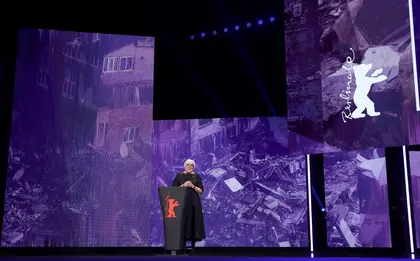From desperate attempts to round up injured troops from the trenches to children playing on burnt-out tanks, Ukrainian filmmakers have brought the battle against Russia in all its horror to this year's Berlinale film festival.
"There are no red carpets at the front line. There is red blood-soaked soil," Ukrainian ambassador to Germany Oleksiy Makeiev told visitors to an event to showcase Ukrainian cinema at the country's embassy in Berlin.
JOIN US ON TELEGRAM
Follow our coverage of the war on the @Kyivpost_official.
"There are no second cuts on the front line. There is only one chance to protect the country," he said.
The Berlinale is championing Ukrainian cinema this year in a bid to support filmmakers and highlight the brutal reality of the country's war with Russia on its first anniversary.
Europe's first big cinema showcase of the year, which runs until Feb. 26, is spotlighting Ukraine with a host of screenings, merchandise and fringe events.
The festival opened on Feb. 16 with a video address from President Volodymyr Zelensky, who is the subject of a documentary premiered at the event by two-time Oscar winner Sean Penn.
Makeiev will also join Ukrainian filmmakers for a red-carpet demonstration on February 24, exactly one year on from Russia's invasion.
And a new European support fund for Ukrainian cinema worth one million euros ($1.06 million) was launched during the festival by the culture ministers of France, Germany and Luxembourg.
- No holds barred -

Ukrainian Film Festival in Warsaw Highlights Experience of War
New Ukrainian films showing at the Berlinale include "Eastern Front", a no-holds-barred documentary filmed on the front line by filmmaker and volunteer medic Yevhen Titarenko.
Co-directed by Titarenko and Russia's Vitaly Mansky, the film leaves nothing to the imagination as it follows the desperate effort to round up injured and dying troops from the trenches.
Titarenko, 34, ran a film production business in Crimea until 2014, when Russia annexed the peninsula.
He travelled to the Donetsk region later that year, initially with the intention of making a documentary.
"I saw with my own eyes what was going on and made a decision to take part as a volunteer," Titarenko told AFP.
He has since made more than a dozen films "to show people how (war) looks from the inside", including this latest focused on the first months of Russia's full-scale invasion.
"Ukrainians don't want to fight and (go to) war, we want to make culture, normal things like in other countries. But we've got no other choice," he said.
- 'Heartbreaking' -
Another new film showing at the festival is Alisa Kovalenko's "We Will Not Fade Away", a documentary following the lives of five teenagers in the Donbas.
Kovalenko, 35, began filming the teens in 2018 as they were preparing to embark on an expedition to the Himalayas.
After Russia's invasion, she temporarily abandoned the project to spend four months fighting on the front line with volunteer battalions in Kyiv and Kharkiv.
She then eventually returned to the footage and began editing it, a process that turned out to be "heartbreaking".
"We understood that we had to change everything in the editing. It's completely another film," Kovalenko told AFP.
The result is a haunting portrait of a fragile peace through the eyes of the teenagers, with the Himalayas expedition itself fading into the background.
"It's about hope and the power of dreams," Kovalenko said.
"Russia can bomb our cities, we stay without electricity, we can have no lights in our windows but if you still have this hope and you have dreams you still can have this light inside you. And this light Russians and war cannot take away from you," she said.
Two of the protagonists have since fled the region, while two have gone missing.
Other Ukrainian films on show include "Do You Love Me?", a fictional portrait of a teenage girl coming of age amid the collapse of the Soviet Union, and "In Ukraine", a documentary showing snapshots of daily life under war in Ukraine's towns and cities.
"In Ukraine" shows children playing on burnt-out tanks and in urban play areas with destroyed buildings in the background.
The festival is also screening Ukrainian director Roman Liubyi's "Iron Butterflies", which chronicles the 2014 downing of Malaysia Airlines Flight 17 by Russian-armed separatists in eastern Ukraine.
"We want to show our solidarity with Ukraine and with the people in Ukraine as well as the filmmakers," festival chief Mariette Rissenbeek told visitors to the Ukrainian embassy.
You can also highlight the text and press Ctrl + Enter










